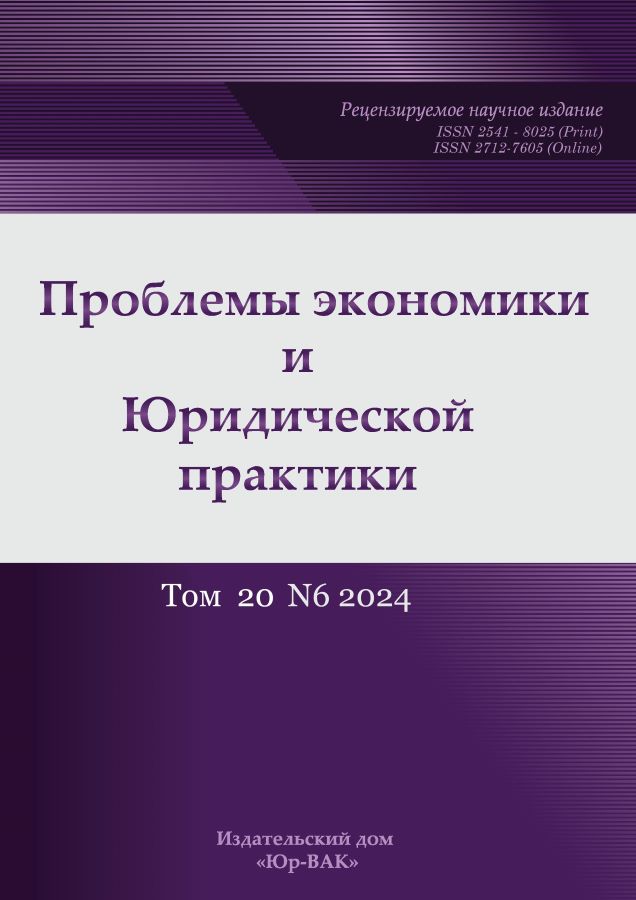Влияние процедуры назначения судей на гарантию независимости судебной власти
- Авторы: Гусаим И.В.1,2, Петров Д.Ю.2
-
Учреждения:
- ФГУП «Главный центр специальной связи»
- Российская академия народного хозяйства и государственной службы при Президенте Российской Федерации
- Выпуск: Том 20, № 6 (2024)
- Страницы: 61-67
- Раздел: Публично-правовые (государственно-правовые) науки
- URL: https://journals.eco-vector.com/2541-8025/article/view/655474
- EDN: https://elibrary.ru/TWSMBU
- ID: 655474
Цитировать
Полный текст
Аннотация
В данной работе авторы рассматривают существующую в Российской Федерации систему отбора и назначения судей на должности с целью определения ее спорных элементов, способных оказать влияние на независимость судебной системы и непосредственно на самих судей. Также авторы рассматривают опыт зарубежных стран по решению вышеобозначенной проблемы в данной сфере. Важность данной работы заключается в необходимости обозрения и предложения путей преодоления существующих проблем, возникших при построении конкурентного и независимого процесса отбора лиц, которые обладая релевантным опытом, знаниями и навыками способны осуществлять правосудие на территории страны.
Полный текст
Об авторах
Иван Вячеславович Гусаим
ФГУП «Главный центр специальной связи»; Российская академия народного хозяйства и государственной службы при Президенте Российской Федерации
Автор, ответственный за переписку.
Email: GusaimIvan1997@yandex.ru
ведущий специалист Управления имущественных и земельных отношений, майор специальной связи; аспирант кафедры Правового обеспечения национальной безопасности Юридического факультета имени М.М. Сперанского Института права и национальной безопасности
Россия, г. Москва; г. МоскваДенис Юрьевич Петров
Российская академия народного хозяйства и государственной службы при Президенте Российской Федерации
Email: petrov-dy@ranepa.ru
SPIN-код: 1908-4025
старший преподаватель Базовой кафедры управления государственным и муниципальным имуществом Института государственной службы и управления
Россия, г. МоскваСписок литературы
- «Ирина Леонидовна Подносова назначена Председателем Верховного Суда РФ» // URL: https://www.vsrf.ru/press_center/news/33466/ (дата обращения 30.04.2024).
- Лукьянова, Е. Г. Правовая система России: современные тенденции развития / Е. Г. Лукьянова; —Текст : непосредственный. // Труды Института государства и права РАН. —2016. —№ 6 (58). —С. 623.
- Рассказов, Л. П. Основные подходы к отнесению современной правовой системы России к соответствующей правовой семье / Л. П. Рассказов. —Текст : непосредственный // Юристъ-Правоведъ. —2013. —№ 6 (61). —С. 11–14.
- Федеральный конституционный закон от 31 декабря 1996 г. N 1-ФКЗ «О судебной системе Российской Федерации»// Собр. законодательства РФ. 1997. № 1. Ст. 1.
- Федеральный конституционный закон от 21 июля 1994 г. N 1-ФКЗ «О Конституционном Суде Российской Федерации» // Собр. законодательства РФ. 1994. № 13. Ст. 1447.
- Конституция Российской Федерации (принята всенародным голосованием 12 декабря 1993 г.).
- Avbelj M. (2018) Contextual Analysis of Judicial Governance in Slovenia. German Law Journal, 19 (7): 1901–1930.
- Blisa A., Kosař D. (2018) Court Presidents: The Missing Piece in the Puzzle of Judicial Governance. German Law Journal, 19 (7): 2031–2076.
- Закон РФ от 26 июня 1992 г. N 3132-I «О статусе судей в Российской Федерации» // Ведомости Съезда народных депутатов Российской Федерации и Верховного Совета Российской Федерации от 30 июля 1992 г., N 30, ст. 1792.
- Пункты 1.4 и 3.3.1 Регламента Высшей экзаменационной комиссии по приему квалификационного экзамена на должность судьи (утв. решением Высшей квалификационной коллегии судей РФ от 29.06.2017, Протокол № 6 // СПС «Консультант-Плюс».
- Федеральный закон от 14 марта 2002 г. N 30-ФЗ «Об органах судейского сообщества в Российской Федерации» // Собрание законодательства Российской Федерации от 18 марта 2002 г. N 11 ст. 1022.
- Пункты 2 и 3 ч. 1 Рекомендаций, подготовленных Бюро по демократическим институтам и правам человека и Исследовательской группой «Минерва» по вопросам независимости судей. Институт Макса Планка, 23–25 июня 2010 г. (Киевская конференция). URL: https://www.osce.org/ru/odihr/73488?download=true (дата обращения: 30.04.2024).
- Федеральный закон от 14 марта 2002 г. N 30-ФЗ «Об органах судейского сообщества в Российской Федерации» // Собрание законодательства Российской Федерации от 18 марта 2002 г. N 11 ст. 1022.
- Определение КС РФ от 21.12.2011 № 1805-О-О «Об отказе в принятии к рассмотрению жалобы гражданки Солодковой Юлии Леонидовны на нарушение ее конституционных прав положениями пункта 5 статьи 6 Закона Российской Федерации "О статусе судей в Российской Федерации" и пункта 1 части первой статьи 134 Гражданского процессуального кодекса Российской Федерации» // СПС «КонсультантПлюс».
- Принцип 1.3 Европейской хартии о статусе судей (принята участниками из европейских стран и двумя международными ассоциациями судей на заседании в г. Страсбурге 8–10 июля 1998 г.).
- П. 27 Доклада специального докладчика по вопросу о независимости судей и адвокатов. Документ ООН № A/ HRC/11/41 (2009).
- Принцип 1.3 Пояснительного меморандума к Европейской хартии о статусе судей (принят участниками из европейских стран и двумя международными ассоциациями судей на заседании в г. Страсбурге 8–10 июля 1998 г.).
- П. 5 Заключения Венецианской комиссии о последних изменениях в Закон «Об основных положениях Конституции» Республики Албания. Док. № CDL-INF(1998)009; п. 27, 46, 47 рекомендации Комитета министров Совета Европы от 17.11.2010 № CM/Rec(2010)12 «О судьях: независимость, эффективность и обязанности».
- Федеральный закон от 03.12.2012 № 229-ФЗ «О порядке формирования Совета Федерации Федерального Собрания Российской Федерации».
- Gee G. (2012) The Persistent Politics of Judicial Selection: A Comparative Analysis. In: A. Seibert-Fohr (ed.) Judicial Independence in Transition. Heidelberg: Springer: 121–145.
- Guarnieri C., Pederzoli P. (2003) The Power of Judges: A Comparative Study of Courts and Democracy. Oxford: Oxford University Press.
- Errera R. (2005) The Recruitment, Training, Evaluation, Career and Accountability of Members of Judiciary in France. In: G. Di Federico (ed.) Recruitment, Professional Evaluation and Career of Judges and Prosecutors in Europe. Bologna: Research Centre for Judicial Studies:42–68.
- Di Federico G. (2005) Recruitment, Professional Evaluation and Career of Judges and Prosecutors in Europe: Austria, France, Germany, Italy, The Netherlands and Spain. Bologna: Research Centre for Judicial Studies.
- Воскобитова Л.А. (2017) Теоретические основы судебной власти. М.: ИНФРА-М.
Дополнительные файлы









